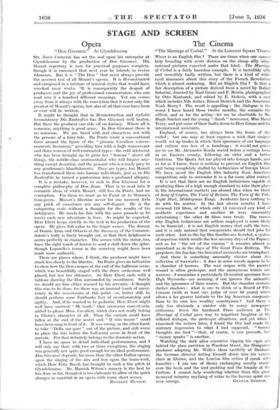The Cinema WHAT is an English film ? There are
times when one cannot help brooding with acute distress on the cheap silly inter- national pictures exported under that label. The Marriage of Corbal is a fairly harmless example. It is incredibly silly and incredibly badly written, but there is a kind of wide- eyed innocence about this story of the French Revolution which is almost endearing. But an English filth? Is that a fair description of a picture deriired from a 'novel by Rafael Sabatini, directed by Karl Grime and F. Bruin, photographed by Otto Kanturek, and edited 1)Y E. Stokvis, with a east which includes Nils Asther, Ernest Deutsch and the American, Noah Beery ? The result is appalling the dialogue is the worst I have heard these twelve months, the scenario the silliest, and as for the acting—let me be charitable to Mr. Hugh Sinclair and the young " dumb " newcomer, Miss Hazel Terry, and put some of their faults down to Herr Grune and his international assistants.
England, of course, has always been the home of the exiled ; but one may at least express a wish that emigres would set up trades in which their ignorance of our language and culture was less of a handicap : it would not grieve me to see Mr. Alexander Korda seated before a cottage loom in an Eastern county, following an older and a better tradition. The Quota Act has played into foreign hands, and as far as I know, there is nothing to prevent an English film unit being completely staffed by technicians of foreign blood. We have saved the English film industry from American competition only to surrender it to a far more alien Control.
It is not that there are no English technicians capable of producing films of a high enough standard to take their place in the international markets (an absurd idea when we think of Song of Ceylon, The Voice of Britain, The Turn of the Tide, Night Mail, Midshipman Easy). Aesthetics have nothing to do with the matter. In the last eleven months I have reviewed 124 films, of which only 13 conveyed any• kind of aesthetic experience and another 48 were reasonably entertaining : the other 60 films were trash. The reason why English technicians are seldom employed is more likely to be financial : it is not English money that calls the tune, and it is only natural that compatriots should find jobs for each other. And so the big film families are fcrmded, a system of nepotism which recalls the less savoury days of the Papacy, and as for "the art of the cinema" it remains almost as unrealised as in the days of The Great Train Robbery. The peepshow, the fun fair, the historical waxworks are triumphant.
And there is something unusually sinister about this collection of waxworks : it does in some moods appear to be a chamber of horrors. The wax corpse with the painted wound is often grotesque, and the anonymous letters one receives—I remember a particularly ill-scented specimen from High Wycombe—are amusing, if one ignores the animality and the ignorance of their source. But the chamber contains darker shadows : what is one to think of a Board of Film Censors (with at least one judge of over 80 years) which allows a far greater latitude to the big American companies than to its own less wealthy countrymen ? And there is only too obviously a sinister side to many newspaper criticisms. Even the hardened Press audience at The Marriage of Corbal gave way to impatient laughter at the inflated dialogue, the grotesque situations, and yet when I examined the notices later, I found the film had made the contrary impression to what I had supposed. " Second thoughts are best "—that, of course, is une proverb, but "money speaks" is another.
Watching the dark alien- executive tipping his cigar ash behind the glass partition in Wardour Street, the Hungarian producer adapting Mr. Wells's ideas tactfully at Denham, the German director letting himself down into his canva,, chair at Elstree, and the London film critics (I speak with humility : I am one of them) exchanging smutty stories over the hock and the iced pudding and the brandy at the Carlton, I cannot help wondering whether from this great moneyed industry anything of value to the human spirit can














































 Previous page
Previous page